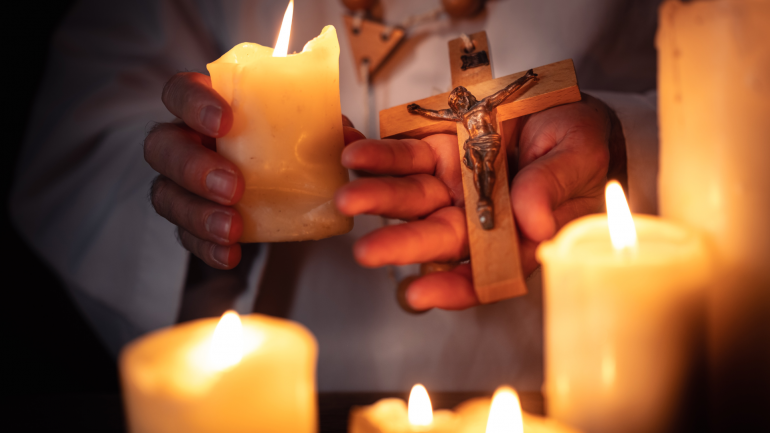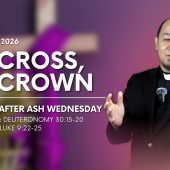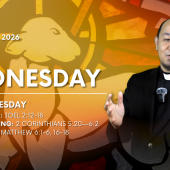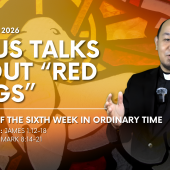Death is not destruction! Suffering purifies the soul!

November 02, 2025 The Commemoration of All the Faithful Departed
Thirty-first Sunday in Ordinary Time
Daily Readings: Wisdom 3:1-9; Romans 5:5-11; John 6:37-40
On this day, we commemorate all the Faithful Departed as one Universal Family called, Holy Mother Church. Christianity as a religion is founded on the resurrection of Jesus and life eternal he promised. Celebrating this day, we express our faith in the resurrection of the dead. St. Paul clearly states that “and if Christ has not been raised, then our proclamation has been in vain and your faith has been in vain” (1 Corinthians 15:14). Jesus guarantees us and all the believers that he will raise us from the dead on the last day (cf. John 6:40).
The First Reading is taken from the Book of Wisdom or The Book of Wisdom of Solomon from Wisdom Literature of the First Testament. It was written in Alexandria of Egypt in Greek language. It was written sometime around late first century BCE to early first century Anno Domini. Today’s text assures that the souls of the righteous are safe and secure in the hand of God. Death is not an end to life for them here on earth but only a transition. Life is not destroyed but is tested and purified like gold in a furnace. These righteous souls have the hope of immortality. They will be at peace, shine and run like sparks on judgement day and on the day of visitation. They will have to go through a time of discipline. God watches over His elect. He showers His grace and mercy upon them. He will make them govern and rule over nations.
The Second Reading is taken from St. Paul’s Letter to the Romans. Addressing the Christians in Rome, Paul argues that hope will save them and it will not disappoint them. The reasons for the same are the following: (i) God’s love has been poured into the hearts of the faithful; (ii) The Holy Spirit has been playing the role of mediator; (iii) Jesus died for the ungodly; (iv) God proves His love by allowing His Son to die for them because the believers in Rome are sinners and enemies of God; (v) The precious blood of Christ will justify them and save them from the wrath of God; (vi) Jesus facilitates reconciliation through his death as the Son of God and finally (vii) the Christians in Rome and consequently all the believers in God will be saved only through their/our faith in Jesus Christ. He grants us the hope of sharing in God’s glory.
The Gospel Reading taken from the sixth chapter of St. John’s Gospel guarantees that Jesus will raise up all the believers on the last day. Today’s text tells us that the incarnation of Jesus is willed by God. He is ready to obey the One who sent him. According to the master plan of God Jesus is destined to suffer, die, be buried and be raised from the dead. God chooses certain people and gives them to Jesus. Jesus welcomes them and will not disappoint them. Jesus cannot afford to lose anyone who is given to him by his Father. Not everything is automatic. God the Father Himself wills that all those who come to Jesus will have to believe in him in order to obtain eternal life.
The entire Gospel of John is written so that all those who want to be saved will have to witness the miracles or signs of Jesus and encounter Jesus personally. They will have to place their belief and trust in Jesus. In the narratives of St. John, ‘seeing is believing’. John says that “Jesus did this, the first of his signs, in Cana of Galilee, and revealed his glory; and his disciples believed in him” (John 2:11). The evangelist concludes the Gospel making the following statement, “But these are written so that you may come to believe that Jesus is the Messiah, the Son of God, and that through believing you may have life in his name” (John 20:31). Faith is at the centre. Thus he convinces the readers that this Gospel has both pastoral as well as missionary purposes but through believing.
Call to Action: We see Jesus and meet him every time we read or listen to the Word of God or participate in the Eucharistic celebration and receive Jesus’ body and blood. Do all these religious activities lead us to faith in him?
Radio Veritas Asia (RVA), a media platform of the Catholic Church, aims to share Christ. RVA started in 1969 as a continental Catholic radio station to serve Asian countries in their respective local language, thus earning the tag “the Voice of Asian Christianity.” Responding to the emerging context, RVA embraced media platforms to connect with the global Asian audience via its 21 language websites and various social media platforms.














